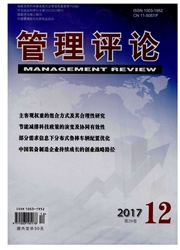

 中文摘要:
中文摘要:
根据"坚持以人为本,全面、协调、可持续的发展观"的科学发展观的内涵构建了生态综合评价指标体系。用组合赋权确定最优权重,用灰色关联理论进行指标评分,建立了基于组合赋权的生态评价模型,并对辽宁省14个城市的生态进行实证分析。本文的创新与特色一是通过把绿色GDP、自然保护区覆盖率等指标纳入"驱动力-压力-状态-影响-响应(DPSIR)"框架模型构建了具体的生态评价体系。探索了把DPSIR框架模型这一生态评价准则具体化的问题。二是通过对指标数值规范化结果的"等距离"缩小与平移,避免了在评价中不可避免的特定规范化结果为0而导致灰色关联度无穷大而无法赋权的问题。三是实证研究表明,影响辽宁省生态发展最主要的指标是城市园林绿地覆盖率、人均公园绿地面积和万元GDP工业废水排放总量。
 英文摘要:
英文摘要:
The scientific outlook on development means putting people first and aiming at comprehensive,coordinated and sustainable development.Based on the outlook's connotations,this paper constructs an ecosystem comprehensive evaluation index system.The ecological carrying capacity evaluation model is established using combined empowering to determine the optimal weight and using gray associated theory to determine the indicators score.Then the paper analyzes the ecological conditions of 14 cities in Liaoning Province.The contributions of this paper come from three aspects: Firstly,putting the specific indicators into the "driver-pressure-state-impacts-response(DPSIR)"model to build an ecology evaluation system to explore the concretion of ecology evaluation criterion of DPSIR.Secondly,equidistantly narrowing and moving the standardization results of the indicators to avoid the inevitable 0 in the evaluation of the specific results of standardized,resulting in grey correlation that can not be empowered.Thirdly,the studies show that the indicators that have the most significant impact on Liaoning Province's ecological conditions are"green cover of urban landscape","park green space area per capita","million GDP of industrial wastewater discharge".
 同期刊论文项目
同期刊论文项目
 同项目期刊论文
同项目期刊论文
 期刊信息
期刊信息
